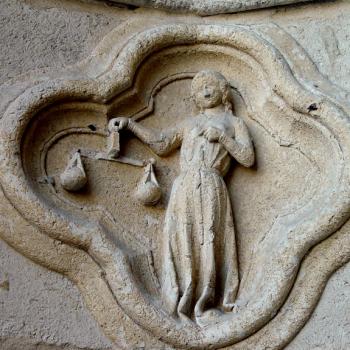
“For the word of the cross is folly to those who are perishing, but to us who are being saved it is the power of God” (1 Cor. 1:18 RSV). Jesus accepted death on the cross as a part of his mission in the world. Those who dot understand why he died, why he accepted such a shameful death, see it as proof of his impotence. They say it is foolishness to the extreme to believe in such an impotent savior. Those who look beyond appearances, and observe what Jesus demonstrated to us with his embrace of the cross, see it differently. They see it as proof of God’s love for us, and for the whole world. God, who has given us free will, has given us the freedom to treat him with contempt, and on the cross, he allowed that contempt to come to competition, to come to its greatest height. Sin was given the freedom to express itself, and show its hand, in the execution of the God-man, Jesus. Sin is destructive. All it does is destroy, and eventually, it will destroy itself and come to an end.
On the cross, Jesus demonstrated the impotence of sin. Sin could not destroy his love. It could not overcome the power of love. It could not divert God from his love for us and willingness to do all that he could do to show us that love. Contempt could not detour Jesus from fulfilling his mission. He took on the sin of the world. He accepted all the pain and suffering which comes from sin. He did not return hate for the hate he experienced, but rather, he continued to show us his love. He took and endured great affliction and yet his love was not destroyed.
Love is not folly, and the word of the cross is not folly, for the word of the cross is love. When Jesus died, sin came to an end, but love did not. When he died, sin was defeated by death. Those of us who see Jesus for who he is can now look upon the cross and see it represents his love. The cross, a vessel of torture and death, has been taken over and become a sign of love, a sign which reminds us of the true power of love:
For he and he alone, through the suffering of the Cross, exposed sin and showed it [to be] inoperative and dead. And so whoever looks intently upon him and believes the enemy has been put to death and become inoperative, this person “puts to death the powers beneath him.” [1]
When we understand the wisdom of the cross, we are to take up our own cross, bear the burden of sin, die to the self, and be transformed so as to share Christ’s mission, the mission to love the world. We must have sin die in us. We must embrace the cross. But we can only do so properly if we recognize the cross is the symbol of love, and so we act in and with the cross, by love. We then see it as a sign of victory. A sign that love overcomes. We cherish the cross with love because the glory of love itself has been revealed on it.
The cross, as the sign of love, should serve as a means of bringing the world together. Sin is the cause of strife, for sin stands against the unitive dimension of love with divisive hate. It encourages us to seek after our own pleasures at the expense of the community, to promote our own luxury while the needs of others are ignored. To embrace the cross, to elevate it, we must follow after its implications. We must cut sin out of our lives, we must put it to an end, and we do this by embracing charity, caritas, in all its forms and expectations. Sensual sins encourage us to reify ourselves, and so break apart from the community, but if we think that is all we must deny, we are far from embracing the cross, as St. Gregory Palamas preached:
As the word and the mystery came before the sign itself, we shall expound them to your charity first. Or rather, Paul expounded them before us, Paul who boasts in the Cross, determined not to know anything, save the Lord Jesus, and Him crucified (cf. 1 Cor. 2:2). What does he say? The Cross means crucifying the flesh with its passions and desires (cf. Gal. 5:24). Do you think he is referring only to the passions of sensual pleasure and gluttony? In that case he would not have written to the Corinthians, “Since there is among you strife and divisions are ye not carnal and walk as men?” (1 Cor. 3:3). Consequently, anyone who loves glory or money, or simply wants to impose his own will in his eagerness to prevail, is carnal and walks as men, since such things are the sources of division. [2]
Those who desire to impose their will on others, those who desire the world, continue to embrace the path of sin. They reify power and authority for the sake of self-gain. They have yet to embrace the cross. Instead, they reject it as foolishness. They think they need to embrace power and dominate others in order to survive. They think those who do not act similarity, those who do not act exclusively with such self-interest in mind, are foolish, showing once again how the word of the cross is folly to those who are perishing. They might gain the world, at least temporarily, but they will lose their souls in the process. What they have gained it fleeting, and even it will be taken from them – nothing they can do will stop the progression of change and the whims of fate. Eventually, they will lose everything. Then they will be shown to be fools, for they will find themselves lost and confused as to what they should do next. But of course Jesus died on the cross even for them. There is hope even for them. After they have suffered a great loss, the shock to the system might make them reconsider their lives. They might, at last, finally understand the wisdom of the cross, embrace the cross for themselves, and join themselves with Christ.
We must embrace the cross. We must follow after Christ and take on the cross for ourselves. Then, like him, we can emerge, free from all that is unlove, ready for eternal life. The cross is glorious. The cross is a marvel. It was intended to shame Christ, but it revealed his glory. It was intended to end his influence upon the world, but instead, it spread it across the world. It was intended to send a message about the power of Rome, but instead all it showed is the greater power of God. Let us, therefore, lift high the cross, and view it for what it is, so that with it and through, we can respond to God’s love with our own love, taking on the cross for ourselves and putting to an end all that would separate us from the love of God.
[1] St. Maximus the Confessor, Questions and Doubts. Trans. Despina D. Prassas (DeKalb, IL: Northern Illinois University Press, 2010), 47 [Question 9].
[2] St. Gregory Palamas, “On The Precious and Life-Giving Cross” in Saint Gregory Palamas: The Homilies. trans. Christopher Veniamin and the Monastery of St. John the Baptist Essex, England (Waymart, PA: Mount Thabor Publishing, 2009), 82.
Stay in touch! Like A Little Bit of Nothing on Facebook.
If you liked what you read, please consider sharing it with your friends and family!













